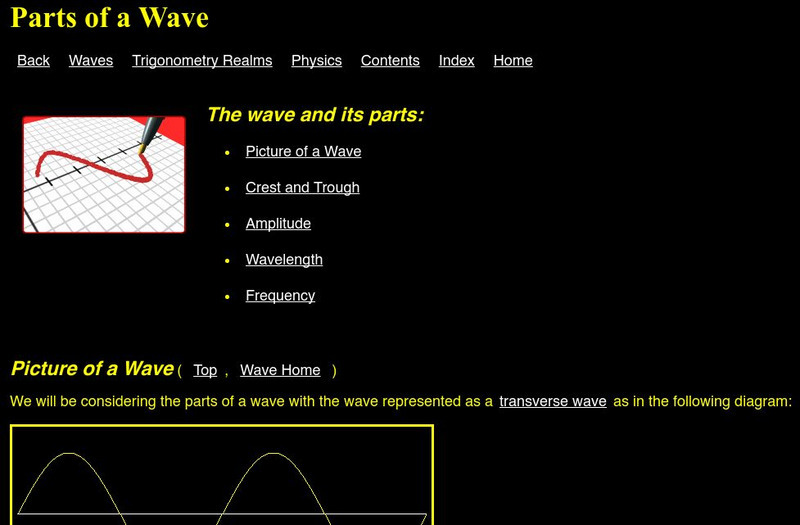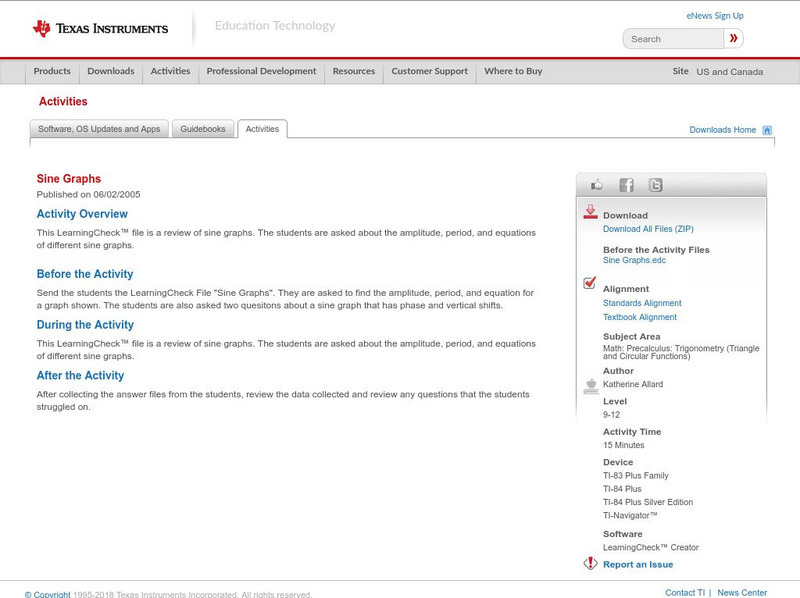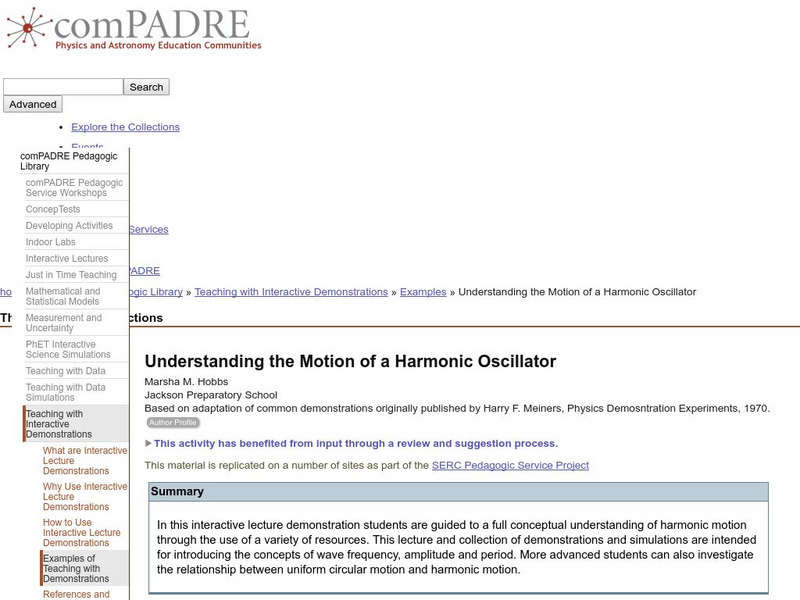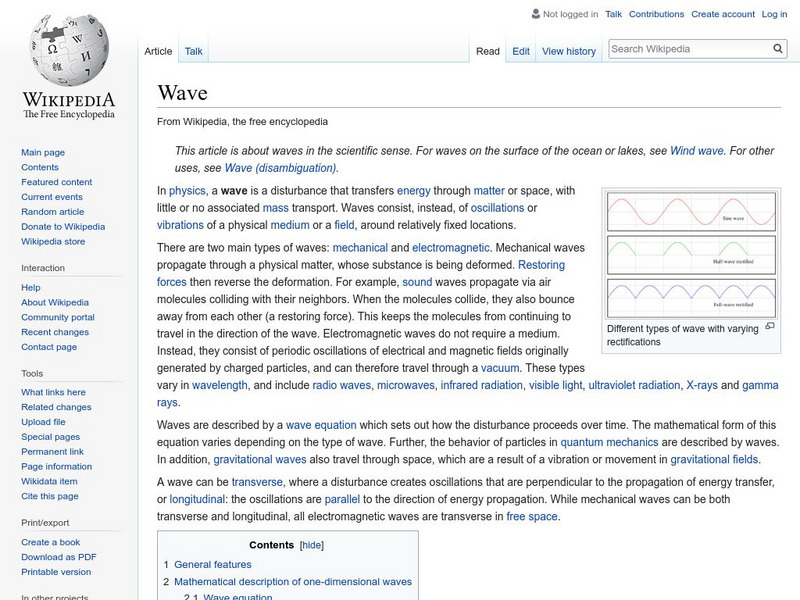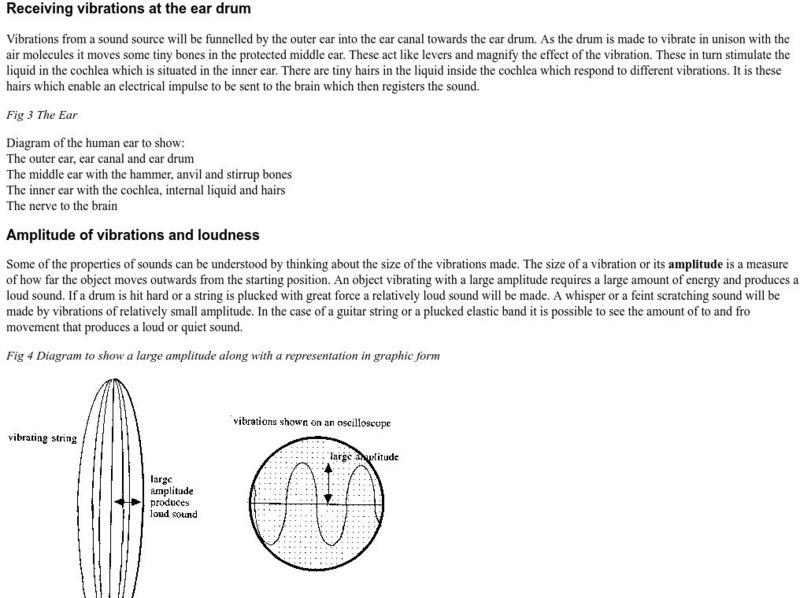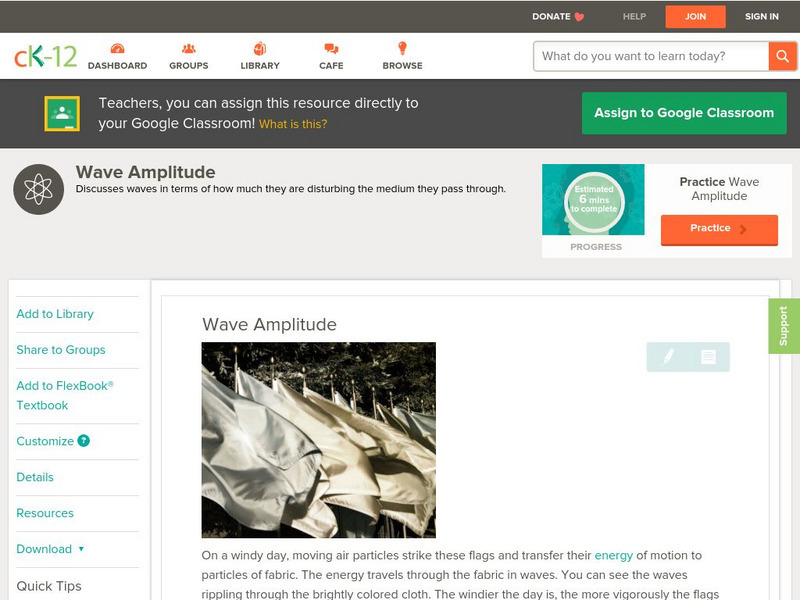BBC
Bbc: Gcse Bitesize: General Properties of Waves
Light travels as waves. Waves can be described by their amplitude, wavelength and frequency. The speed of a wave can be calculated from its frequency and wavelength.
PBS
Pbs Learning Media: Sound Waves: Interactive Lesson
Learn about sound waves, which move vibrations from one place to another through liquids, gases and solids, with this interactive lesson.
Concord Consortium
Concord Consortium: Stem Resources: How Loud, How High?
What are ways to describe sound? Using the program downloaded called Sound Grapher and the microphone on the computer, students can investigate the frequency, wavelength, amplitude, and velocity of sound waves. Activity includes detailed...
Curated OER
Education in Physics and Mathematics: Wave Parts
A physics site, it describes aspects of waves, like the sine wave The explaination is good and it illustrates the connection between mathematics and physics.
Georgia State University
Georgia State University: Hyper Physics: Traveling Wave Relationship
Online physics text that illustrates and explains the various characteristics of waves such as amplitude, period, frequency, wavelength, and speed. Includes interactive exercises.
University of Kentucky
The Physics and Math of Music
Read about a math research project done by three college students which helps us see physics and math in music. Here's a great approach for integrating curriculum!
University of Guelph
University of Guelph: Physics Tutorials: Amplitude, Period, and Frequency
A tutorial describing the characteristics of simple harmonic motion. Utilizes animations, mathematical equations, and interactive questions to teach essential principles.
University of California
Uc Berkeley: How Do You Measure a Light Wavelength?
Cool science site tests your knowledge of light by exploring the question: "How do you measure a light wavelength?" Allows users to test themselves as well as provides additional activities on wavelength and amplitude.
Texas Instruments
Texas Instruments: Using Trnsfrm App
This activity introduces the use of TRNSFRM APP and the effect of A and B in AX + B as well as discovering Amplitude, Period and Vertical shift of sinusoids with the aid of a slinky!
Texas Instruments
Texas Instruments: Sine Graphs
This LearningCheck file is a review of sine graphs. The students are asked about the amplitude, period, and equations of different sine graphs.
Science Education Resource Center at Carleton College
Serc: Understanding the Motion of a Harmonic Oscillator
An interactive lecture demonstration where learners are guided to a full conceptual understanding of harmonic motion. This lecture and collection of demonstrations and simulations are intended for introducing the concepts of wave...
Wikimedia
Wikipedia: Wave
An in-depth encyclopedia article from Wikipedia on waves gives a definition for what a wave is. Other content in the article includes a list of examples and characteristics of waves, information about the difference between transverse...
Other
Dans Math: Lessons: Trigonometry
College professor Dan Bach reviews basic trig concepts, including trig functions, right triangles, circles, radians, and polar coordinates. Site includes animated graphs and detailed examples.
Other
Univ. Of Leicester: Amplitude of Vibrations and Loudness
Discusses the ear drum receiving vibrations and how the amplitude of those vibrations translates into the loudness of the sound. Good diagrams to illustrate this concept.
The Franklin Institute
Franklin Institute: Music to Our Ears
Discover the connection between sound waves and hearing with this webpage tutorial. Be sure to click on the picture for detailed information.
Scholastic
Scholastic: Study Jams! Science: Energy, Light and Sound: Sound
A video and a short quiz on how sound travels in waves, its properties, and how to measure it.
Exploratorium
Exploratorium: Science Snacks: Resonator
An experiment in resonance that demonstrates how to synchronize an applied force with an object's natural frequency and amplify the resulting motion.
Lawrence Hall of Science
The Math Page: Trigonometry: Graphs of the Trigonometric Functions
Here is a site that clearly and thoroughly explains how to graph each of the six trigonometric functions and determine the period, amplitude, phase shift, and vertical shift of each. There are example problems solved, problems for the...
OpenStax
Open Stax: Catherine Schmidt Jones: Sound and Music
Introduce some activities that introduce students to the physics of sound. They will also learn how various instruments produce sound. Included are downloadable pdf worksheets and answer sheets to use.
Physics Classroom
The Physics Classroom: Forced Vibration
This physics tutorial explores forced vibration. Includes links to natural frequency, standing wave patterns and fundamental frequency and harmonics.
Physics Classroom
The Physics Classroom: Intensity and the Decibel Scale
Physics tutorial invites users to learn about sound properties and their perception. Learn more about intensity and the decibel scale, and then take a quiz to check your understanding.
CK-12 Foundation
Ck 12: Physical Science: Wave Amplitude
[Free Registration/Login may be required to access all resource tools.] What wave amplitude is and how to measure it, and what determines the amplitude of a wave.
Yale University
Open Yale Courses: Physics 200: Simple Harmonic Motion
This lecture on simple harmonic motion includes descriptions of amplitude, frequency and period. The lecture comes in several formats including video, audio and transcript.
Texas Instruments
Texas Instruments: Sine and Cosine
This set of questions measures knowledge of amplitude, horizontal and vertical shift, and periods of sine and cosine graphs. Questions are multiple-choice and true/false; solutions are included.





